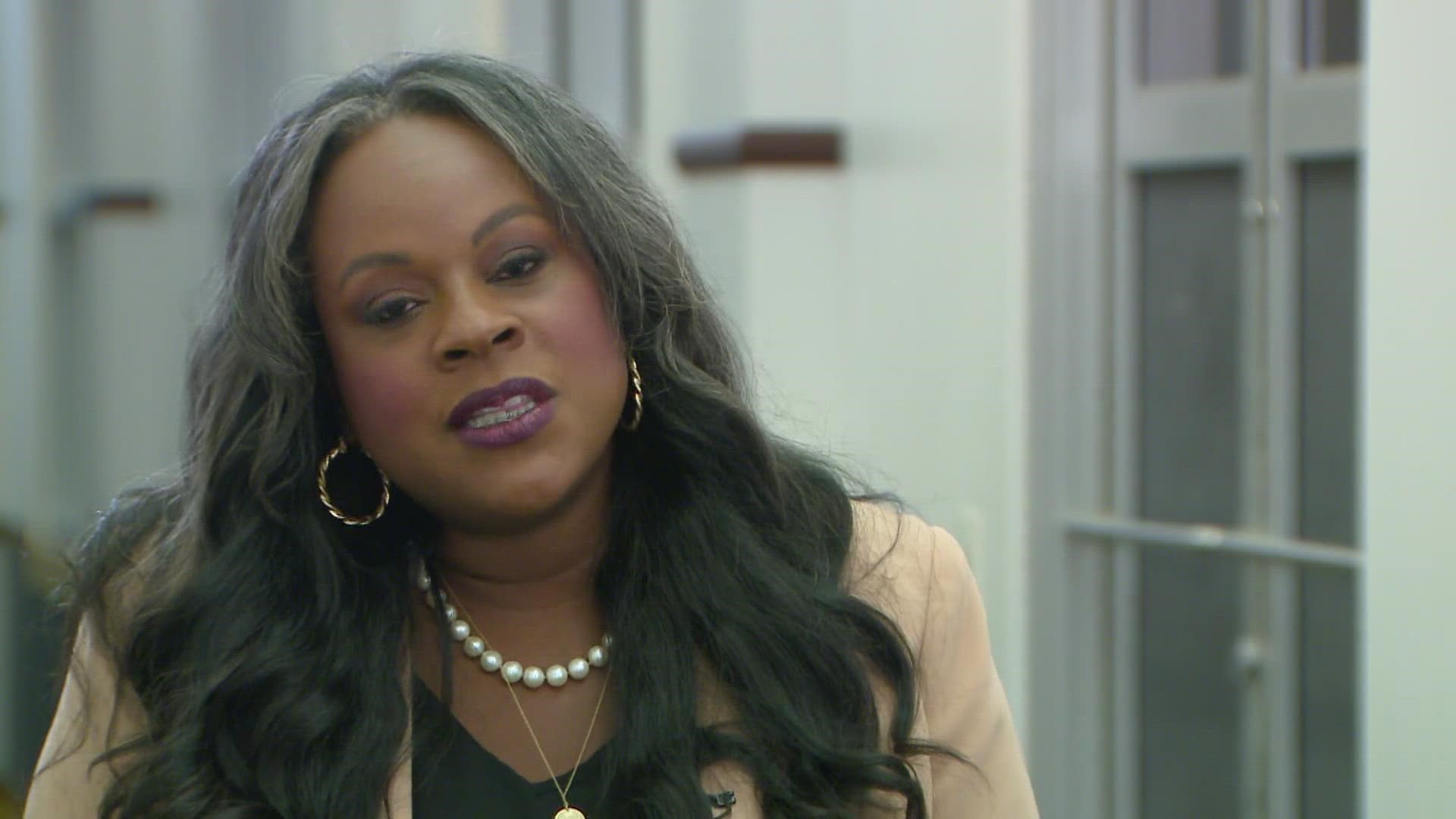DENVER — Democratic State Rep. Leslie Herod, a champion of progressive causes in the state legislature, is entering the race for Denver mayor as a possible frontrunner in a crowded field.
“I think we have the opportunity to continue to grow and go in the right direction, but we’re also at a point that we could go in the wrong direction,” Herod said. “What I think Denver needs is real leadership that will steer us in the right direction but also involves community in that conversation.”
Herod discussed her decision to join the race with Next’s Kyle Clark ahead of a public announcement Thursday.
> Watch the full interview
Herod said adding affordable housing, both for low-income and middle-income Denverites, is a top priority.
“People can’t afford to live in Denver,” Herod said. “We need more housing across the spectrum and we’re not doing enough.”
Herod said Denver was not moving aggressively enough to spend federal COVID funding on affordable housing.
“We can’t keep pushing people out to Aurora or Arvada or, quite frankly, the streets,” Herod said. “We need to make sure we have affordable housing and we need to do it quickly.”
She stopped short of saying Denver should effectively eliminate single-family zoning, as Minneapolis and the states of Oregon and California have done.
“That is something we need to talk to more Denverites about,” Herod said. “I think doing away with anything completely is probably not the answer.”
Herod said she’d seek to build consensus on approaches to adding affordable housing, drawing on the lessons learned in those communities.
Herod also didn’t endorse the idea of rent control. Denver would need a change to state law in order to enact sweeping rent control. Rent control was opposed by Denver Mayor Michael Hancock.
“I think rent control is interesting,” Herod said. “I think it's become a very divisive phrase or slogan.”
“There are things about ensuring that we’re stabilizing the cost of housing that actually work and are great ideas,” Herod said. “But we want to make sure that what we’re not doing is incentivizing people to stay in rent-controlled housing so that new people can’t come in, new families can’t come in.”
In 2016, Herod became the first openly LGBTQ+ African American elected to the General Assembly. She was reelected in 2018. Herod represents House District 8, which includes Park Hill, Five Points, Uptown and East Colfax.
If elected, Herod would arguably be Denver’s most outspoken progressive in the mayor’s office. Asked if she felt she’d be Denver’s first truly progressive mayor, Herod pointed to specific progressive priorities of former Mayors Federico Peña, Wellington Webb and John Hickenlooper.
“I think a lot of Denver mayors came in with new fresh ideas,” Herod said. “I believe that they were progressive for the time.”
When it was noted that Herod did not include current Mayor Hancock on her list, Herod said she would include him as well.
Herod called Hancock’s aggressive sweeps of homeless encampments a failed policy.
Herod said a final decision on whether to continue the policy would be up to City Council, but that she would like to see them replaced with a new approach.
She said Denver must address its “steep trajectory into homelessness,” citing a recent Colorado Health Foundation study that found more than three in ten Coloradans fear losing their homes.
Police reform has been a significant focus of Herod’s time in the legislature. Her sweeping law enforcement reform bill stripped officers of qualified immunity, allowing them to be sued personally for misconduct, and created a duty for officers to report wrongful actions by their colleagues.
Herod said she’s seen policing in Denver move in a positive direction.
“We have to have policing in our communities that we actually believe in,” Herod said. “We have to be able to trust and also support our law enforcement officers and also support our community. Those shouldn’t be separate things.”
Herod pointed to her work creating the STAR program, which sends mental health professionals on emergency calls where no threat of violence is expected.
The highly-acclaimed program, which is now championed by Denver Police leadership as well as neighborhood activists, has become a model for other communities in Colorado.
(Editor’s note: A nonprofit organizer of the STAR program was a featured nonprofit on Next with Kyle Clark’s weekly microgiving campaign, Word of Thanks, in 2020.)
Herod is the third prominent woman to announce a mayoral run this summer. She joins former Denver Metro Chamber of Commerce CEO Kelly Brough and longtime Denver City Councilwoman Debbie Ortega in the race, which also includes a half dozen longshot candidates.
Herod is expected to cruise to reelection in her heavily-Democratic House district in November.
The Denver municipal election is in April.
She said she plans to stay in the legislature while running for mayor.
"As a legislator, community leader, and executive of Caring for Denver, I'm used to wearing multiple hats," Herod said. "I'm great at it."
In 2003, then State Sen. Penfield Tate (D) was not up for reelection when he resigned his seat to run for Denver mayor.
"I just knew how much time it took to run for mayor," Tate told 9NEWS on Thursday. "I did not want to shortchange my constituents."
Tate, who ran unsuccessfully for Denver mayor in 2003 and 2019, said Thursday he was still considering joining the 2023 race for either mayor or City Council At-Large.
Legislators are prohibited from receiving campaign donations from lobbyists during the January to May legislative session.
While the rule does not apply to a municipal campaign committee, Herod told 9NEWS she will apply that same rule to her mayoral campaign account while the legislature is in session.
SUGGESTED VIDEOS: Colorado 2022 elections

